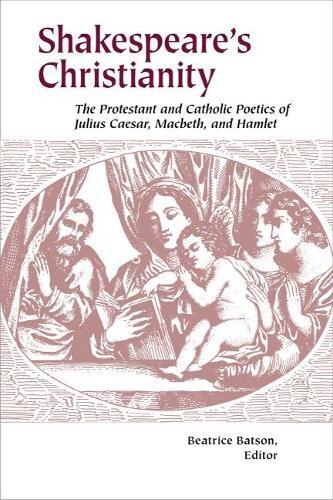Overview
This volume explores the influences of Catholicism and Protestantism in a trio of Shakespeare's tragedies: Julius Caesar, Macbeth, and Hamlet. Bypassing the discussion of Shakespeare's personal religious beliefs, Batson instead focuses on distinct footprints left by Catholic and Protestant traditions that underlie and inform Shakespeare's artistic genius.
Full Product Details
Author: Beatrice Batson
Publisher: Baylor University Press
Imprint: Baylor University Press
Dimensions:
Width: 15.30cm
, Height: 1.40cm
, Length: 22.90cm
Weight: 0.304kg
ISBN: 9781932792362
ISBN 10: 1932792368
Pages: 150
Publication Date: 30 December 2006
Audience:
College/higher education
,
Professional and scholarly
,
Undergraduate
,
Postgraduate, Research & Scholarly
Format: Paperback
Publisher's Status: Active
Availability: Manufactured on demand

We will order this item for you from a manufactured on demand supplier.
Reviews
These essays, which seek to demonstrate how powerfully Shakespeare's artistry is informed by Christian tradition and culture, are admirably free of narrow doctrinal or exegetical restriction. As we make our way through these essays, here observing Shakespeare's Catholic sensibility and there his Protestant one, we see the playwright's infinite variety in a light both familiar and critically new. - JOSEPH CANDIDO, University of Arkansas This stimulating collection of smart essays demonstrates not only that Shakespeare was theologically informed but also that Christian language and concepts were integral to the design of his major tragedies. The formidable contributors enable us to hear lost echoes of Scripture and sermon, polemic and Prayer Book that reverberate in nearly every scene. - PETER LEITHART, New St. Andrews College
These essays, which seek to demonstrate how powerfully Shakespeare's artistry is informed by Christian tradition and culture, are admirably free of narrow doctrinal or exegetical restriction. Taken as a whole, they serve to remind us how thoroughly and with what apparent effortlessness Shakespeare absorbed nuances of the full range of Christian thought and expressed these ideas-often obliquely but nonetheless importantly-in his dramas. As we make our way through these essays, here observing Shakespeare's Catholic sensibility and there his Protestant one, we see the playwright's infinite variety in a light both familiar and critically new. -Joseph Candido, University of Arkansas The cultural air of Elizabethan England was thick with theological discourse, yet Shakespeare has often been read as if he hovered above it all in a sublime cocoon of pure art. This stimulating collection of smart essays demonstrates not only that Shakespeare was theologically informed but also that Christian language and concepts were integral to the design of his major tragedies. The formidable contributors enable us to hear lost echoes of Scripture and sermon, polemic and Prayer Book that reverberate in nearly every scene. -Peter Leithart, New St. Andrews College
Author Information
Beatrice Batson (Ph.D. Vanderbilt University) is Professor Emeritus of English at Wheaton College.




